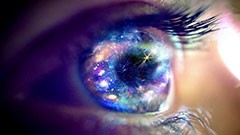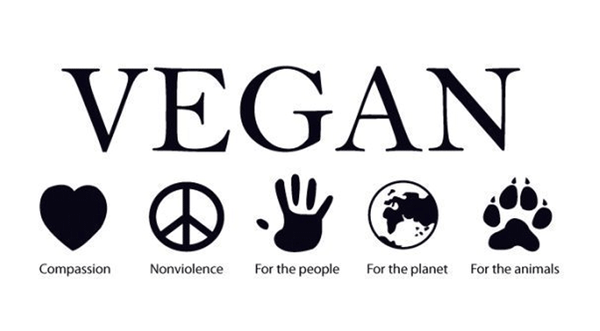Index:
Introduction
You vegans still kill a lot of animals by accident, aren’t you a bit hypocritical?
But there are vegans who don’t get enough nutrition, what about them?
What about the protein?
What about genetics, blood type and diet?
What about the B12?
What about the essential amino acids?
What about omega 3?
Is there a way I can check the nutrients in my present or future diet to see if I would lack something?
What about the difference in the use of resources between a vegan vs meat lifestyle?
What about the history of veganism? Have we not always eaten meat?
But what does our anatomy say about what kind of food we are built for?
But I am doing workouts and fitness training, is it possible to be vegan and still be strong?
What about the differences in health when it comes to a meat vs vegan diet?
Is there a documentary specifically about the health effects of the consumption of animal products?
Are there any doctors out there recommending veganism?
Well, I am still not convinced. Do you have anything more to say or to recommend me watching?
Where can I find more information about this subject?
Introduction
Before we jump to the questions and answers about veganism, I would like to make a short introduction to show you where I come from. I was practically born in the backpack of my father, who was a very active hunter and fisherman who hunted all kinds of animals like bears, moose, birds, and hares. I was also brought up in a small village with a few people that had farms, and I had friends in other nearby villages who had big dairy farms. I’ve been taught how to hunt different animals and also how to fish different kinds of fish, which includes the preparation of these animals, which means everything from slaughter to ending up on the dinner table. I want you to read this to understand that I firmly understand the perspective of one eating meat, of one that hunts, of one that fishes, and of one who is a farmer. I’ve lived it all and experienced it all for myself, but one day I woke up and realized the moral implications of all this for the simple reason that none of it is necessary for our own survival, which is something I was never taught but something I had to figure out for myself in later years.
So there you go. That is my brief introduction to where I’m coming from, and I hope you keep that in mind while going through these different questions and answers. That said, I have to get this out of the way as well, and that is that one who is supporting the meat, egg, and dairy industries is actively supporting animal slaughter and cruelty because the money that you pay for your “food” is going straight to the industries and farmers that are causing it in the first place. It doesn’t matter if it’s free range, happy cows, happy chickens, happy pigs, or whatever; they get slaughtered very early in their lives when they could have lived long and healthy lives instead. We do have another choice, and there are millions of us that don’t consume or use animal products without any health issues or problems, but instead are thriving. The question of humane slaughter that often comes across as an argument, I have to say that it’s a contradiction of terms, double speak. An example would be to ask yourself if it would be okay for yourself to be “humanely” killed when you do not want to die. No, it would not, there’s nothing humane about it. The definition of humane goes as follows: acting in a manner that causes the least harm to people or animals. To kill someone who doesn’t want to die is not causing the least amount of harm, it’s causing the maximum amount of harm.
You vegans still kill a lot of animals by accident, aren’t you a bit hypocritical?
Yes, we do, but veganism is all about reducing the suffering of animals as much as possible. No vegan is exempt from the fact that we do kill animals by accident because it isn’t possible today to live without killing animals, but that doesn’t automatically mean that we should just kill even more animals for our own pleasure. There is a big difference between accidental killings and intentional killings. The intention makes all of the difference in the world, especially for the animals in our slaughterhouses. The number of killed animals is far lower on a vegan lifestyle than on a vegetarian or meat lifestyle, and in order to fully understand things, we must put ourselves in the position of the victim, not the oppressor. Also, there is a new farming technique that requires zero killing of animals, which is vertical farming. To read more about that, check out this link, which is about Aerofarms, the world’s largest vertical farms.
But there are vegans who don’t get enough nutrition, what about them?
A lack of understanding when it comes to eating properly causes a deficiency in nutrition, no matter if you are a vegan, vegetarian, or meat eater. All of the nutrition you need does exist in a plant-based diet, you only need to learn what to eat, which, in truth, everyone should do in order to keep the body healthy and free from things like cancer, diabetes, heart disease, etc. It is even shown that those going on a plant-based diet have fewer problems with nutrient deficiency than omnivores, and you can read more about it in this article written by Dr. Michael Greger.
What about the protein?
Well, you can’t really consume anything without getting some protein, well maybe jello. In fact, I would go as far as to say, have you ever heard a doctor say to a patient that he or she has a protein deficiency? If you are wondering about sources that are rich in protein, then I would recommend nuts, seeds, beans, and hemp.
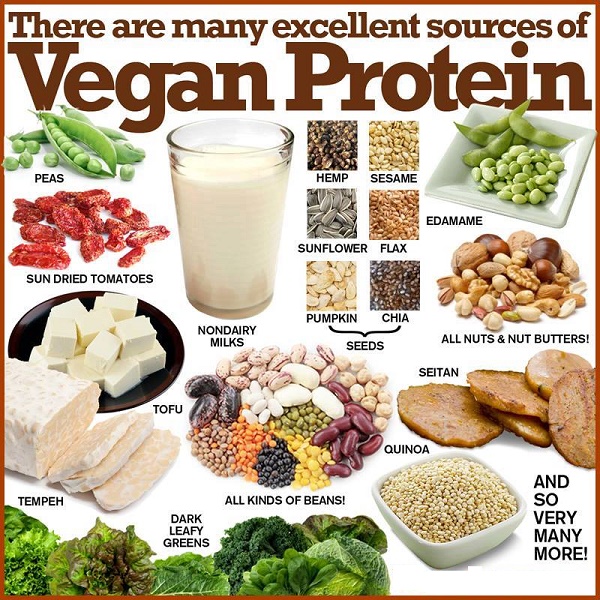
I would even go so far as to say there is a deliberately created myth about protein, and if you do not take my word for it, then this presentation with Janice Stanger might help you understand why. Janice Stanger, Ph.D., is a nutrition expert, educator, speaker, and author of The Perfect Formula Diet: How To Lose Weight and Get Healthy Now With Six Kinds of Whole Foods.
What about genetics, blood type and diet?
Well, the idea that our blood type or genetics determines what diet is most suitable for us has not yet been established and proven, but the idea seems to be floating around as if it has. Here is Dr Michael Greger showing that neither blood type nor genetics show us that we are suited for different diets.
Source: https://nutritionfacts.org/video/blood-type-diet-debunked/
What about the B12?
When it comes to B12, people need to understand that B12 is produced naturally in our small intestines because of bacteria. Here is a good quote from Dr Gina Shaw from this article where she talks about this.
B12 synthesis is known to occur naturally in the human small intestine (in the ileum), which is the primary site of B12 absorption. As long as gut bacteria have cobalt and certain other nutrients, they produce vitamin B12. Dr Michael Klaper argues that vitamin B12 is present in the mouth as well and intestines. Furthermore, Dr Virginia Vetrano states that active Vitamin B12 coenzymes are found in bacteria in the mouth, around the teeth, in the nasopharynx, around the tonsils and in the tonsillar crypts, in the folds at the base of the tongue, and in the upper bronchial tree. Absorption of the natural B12 coenzymes can take place in the mouth, throat, oesophagus, bronchial tubes and even in the upper small intestines, as well as all along the intestinal tract. This does not involve the complex enzyme mechanism for absorption (Intrinsic Factor) in the small intestine as required by cyanocobalamin. The coenzymes are absorbed by diffusion from mucous membranes (11).
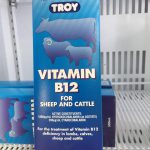 If sheep and cattle get B12 supplements because of deficiency, then humans can as well without the need to filter them through another body. Those who suffer from B12 deficiency are most likely not taking their B12 supplements and are having problems with absorption due to gastrointestinal issues for various reasons, including the diet itself.
If sheep and cattle get B12 supplements because of deficiency, then humans can as well without the need to filter them through another body. Those who suffer from B12 deficiency are most likely not taking their B12 supplements and are having problems with absorption due to gastrointestinal issues for various reasons, including the diet itself.
Here is a good video with Dr Michael Klaper about B12.
Here is a good video about B12 from Michael Greger M.D at Nutritionfacts.org
Here is an interview with Michael Greger M.D that goes through the subject of B12 shortly.
Also to gain some perspective about B12 with Michael Greger M.D
To end, I would suggest that people watch this video that talks about a study that shows that B12 deficiency is also common among meat eaters, especially over the age of 50.
What about the essential amino acids?
Here is a video that also talks about the protein-combine myth that was created and debunked decades ago. It’s with Dr Michael Greger from Nutritionfacts.org.
What about omega 3?
It’s not recommended to eat fish at all, considering the high content of environmental toxins such as PCBs, mercury, and other pollutants that actually cause cognitive decline in both adults and children. Far better and cleaner sources are flax seeds, soy, walnuts, canola oil, chia seeds, hemp seeds, and their oils, and of course, algae-based supplementation of DHA and EPA.
Is there a way I can check the nutrients in my present or future diet to see if I would lack something?
You can sign up on https://cronometer.com, which is totally free to use, where you can fill in the different foods and see what kind of nutrients you might lack.
What about the difference in the use of resources between a vegan vs meat lifestyle?
Check out this 11-minute video that goes through all of this, and there are notes and sources for everything that is being said in the video at this link.
Here is also an excerpt from a recent 5 year study about the environmental impact of food production.
“Most strikingly, impacts of the lowest-impact animal products typically exceed those of vegetable substitutes, providing new evidence for the importance of dietary change. Cumulatively, our findings support an approach where producers monitor their own impacts, flexibly meet environmental targets by choosing from multiple practices, and communicate their impacts to consumers. Today, and probably into the future, dietary change can deliver environmental benefits on a scale not achievable by producers. Moving from current diets to a diet that excludes animal products (table S13) (35) has transformative potential, reducing foods land use by 3.1 (2.8 to 3.3) billion ha (a 76% reduction), including a 19% reduction in arable land; foods GHG emissions by 6.6(5.5 to 7.4) billion metric tons of CO2 eq (a 49% reduction); acidification by 50% (45 to 54%); eutrophication by 49% (37 to 56%); and scarcity-weighted freshwater withdrawals by 19% (−5 to 32%) for a 2010 reference year.”
What about the history of veganism? Have we not always eaten meat?
Just because we have done something for a long time doesn’t necessarily make it the right thing to do. We have also murdered, raped, abused, and had wars throughout the eons, and is that something that we should uphold just because we have done it in the past? I think that what we need to do is look at our history, learn from it, and see what kind of mistakes we’ve made and what we can do better. When it comes to the history of veganism, the principle behind it is far older than what we have been led to believe. Here are three parts that go through the history of veganism.
Part 1: Vegans in ancient times
Part 2: Vegans in the middle ages
Part 3: Vegans in the renaissance
Just as a note, when it comes to the question of whether we have always eaten meat. The fact that we do not produce our own vitamin C tells us that we are extremely connected to fruits, berries, and vegetables. According to one source, the gene for producing vitamin C stretches back 60 million years and is still inactive. So for 60 million years, we have not produced our own vitamin C, which requires the consumption of fruits, berries, and vegetables in order to survive, or we may die from scurvy.
“Vitamin C Production in Goats vs Humans”
The requirement of ascorbic acid is a common property among living organisms. It has long been considered that all animals with the exceptions of guinea pigs, monkeys, and humans can produce their own vitamin C. Scientist have extensively studied the human genome and identified the defective gene for the synthesis of the active enzyme protein, L-gulonolactone oxidase or GLO (Stone 1979). This mutation is said to have occurred some 60 million years ago. The absence of GLO in the human liver blocks the conversion of glucose into ascorbic acid leading to an illness known as Scurvy (Inborn error of carbohydrate metabolism).
https://blog.livonlabs.com/goat-vitamin-c-production/
A quick search for how long we eaten meat suggests 2.5 million years.
“”Evolving to Eat Mush”: How Meat Changed Our Bodies”
Carnivorous humans go back a long way. Stone tools for butchering meat, and animal bones with corresponding cut marks on them, first appear in the fossil record about 2.5 million years ago. How Did Meat-Eating Start? Some early humans may have started eating meat as a way to survive within their own ecological niche. Competition from other species may be a key element of natural selection that has molded anatomy and behavior, according to Craig B. Stanford, an ecologist at the University of Southern California (USC).
https://news.nationalgeographic.com/news/2005/02/0218_050218_human_diet.html
Exactly. Meat eating may have started as a survival thing, in combination with competition, or who knows, it has stuck with us ever since, just like there are cannibals that still live. That means that we have eaten anything but meat for 57.5 million years, which clearly shows that we have adapted to a non-meat diet and are yet to adapt to eating meat since even low levels of animal protein increase the production of Insulin-like Growth Factor 1 (IGF-1) that increases the risk of cancer, which shouldn’t happen if we are truly designed for the consumption of meat.
But what does our anatomy say about what kind of food we are built for?
Let’s look at this table that is created by Dr Milton Mills after his comparative study of our anatomy.
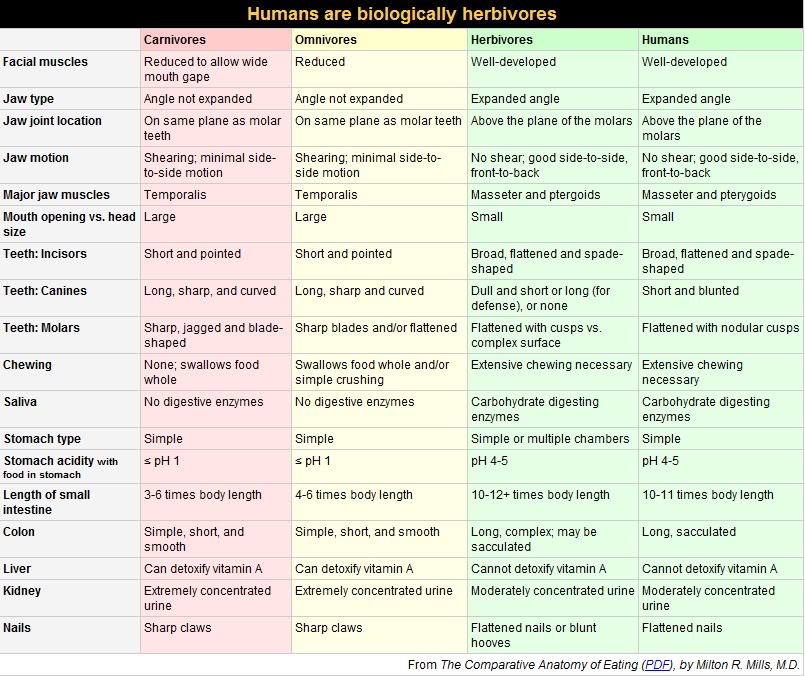
Humans are naturally plant-eaters is an article that is written by Michael Blueja
Here is a short summary of why we aren’t scavengers or even meant to eat meat.
I’ve also written an article where I tackle some key points like anatomy, biology, physiology, B12, cholesterol, vitamin C, IGF-1, TMAO, longevity, food consumption statistics, food consumption history, and the development of the brain to show that we are not designed to eat meat, and it can be found here.
But I am doing workout and fitness training, is it possible to be a vegan and still be strong?
We have one vegan bodybuilder, Barney Du Plessis, and then you have Patrik Baboumian, who broke the world record in yoke. There are many other examples of vegan people who thrive on the vegan lifestyle, but I thought I would bring these two together at least to show that you can get fit and strong and get all of the nutrition through a plant-based diet. If you want a list of vegan athletes, then check out this page, and here is a link to a movie called The Game Changers, which is about the story of James Wilks, an elite special forces trainer and winner of The Ultimate Fighter, as he travels the world on a quest for the truth behind the world’s most dangerous myth: that meat is necessary for protein, strength, and optimal health. Meeting elite athletes, special operations soldiers, visionary scientists, cultural icons, and everyday heroes, what James discovers permanently changes his relationship with food and his definition of true strength.
Patrik Baboumian talks about his diet.
What about the differences in health when it comes to a meat vs vegan diet?
Here you can watch an 11-minute video that shows what the difference would be for people on their different diets in healthcare costs. This is, of course, not the whole story of it all and is very short, but at least it gives you a picture of the difference. If you would like to know more, I would suggest researching it for yourself and also checking out the page at https://nutritionfacts.org for more information.
Is there a documentary specifically about the health effects of the consumption of animal products?
Yes, here is a newly produced documentary called “What The Health” with Kip Andersen who is also behind the documentary “Cowspiracy” and here is the description of the documentary.
An intrepid filmmaker on a journey of discovery as he uncovers possibly the largest health secret of our time and the collusion between industry, government, pharmaceutical and health organizations keeping this information from us. What The Health’ explores the secret prevention and cure for cancer and all other so called ‘diseases’. Including the cure for diabetes, heart disease, obesity, arthritis, dementia. Nature’s healthiest diet kept secret by governments and corporations.
Then of course we got the latest documentary called Dominion and here is the description of the documentary.
‘Dominion’ is the feature-length documentary sequel to 2014’s Lucent.
While Lucent focused mostly on the Australian pig farming industry, Dominion will have a much broader scope as a comprehensive account of the numerous ways animals are used and abused in Australia. By exploring six primary facets of our interaction with animals – Companion Animals, Wildlife, Scientific Research, Entertainment, Clothing and Food – the film will question the morality and validity of our dominion over the animal kingdom.
Drawing heavily from the Aussie Farms Repository so as to contain the most recent, highest-quality footage from across the country, Dominion will also make use of emerging technologies, such as aerial drones, to capture new perspectives and examine the wider context of animal exploitation upon our landscape and within our society.
Dominion was announced in October 2015 with a crowdfunding campaign which raised over $19000, and in December 2015 received a grant from animal protection institute Voiceless. A further crowdfunding campaign finished in January 2018.
Are there any doctors out there recommending veganism?
Why doctors don’t recommend veganism today is because they lack knowledge in nutrition, which they do not get in their medical training. This is a global issue that needs to be resolved.
Here are a few good 30-minute videos with different doctors who are actively promoting a whole-food plant-based diet.
1: Dr Michael Greger
2. Dr Neal Barnard
3. Dr John McDougall
4. Dr Alan Goldhamer
5. Dr Michael Klaper
6. Dr Anthony Hadj
Well, I am still not convinced. Do you have anything more to say or to recommend me watching?
I guess I could include a video with one of the greatest speakers in the world when it comes to the topic of veganism, and that is Gary Yourofsky. Here is a presentation that he had that I think will give you some thoughts about the moral issues. Gary Yourofsky, an animal liberation activist, national lecturer on animal rights and veganism, and founder of ADAPTT, a non-profit organization based in the US
The speech was held at Georgia Tech university in July 8 2010.
Where can I find more information about this subject?
I would also recommend checking out Vegan.com and The Vegan Society for more information. Then, of course, I would list some documentaries that go through the different aspects that animal agriculture and fishing are causing in the world. Here is the list of documentaries: https://www.peta2.com/blog/animal-rights-movies-netflix/
Here are some useful links that I think people can browse through on their own to look at the different aspects of veganism.
Dr Pam Popper
Bite Size Vegan by Emily Moran Barwick
A Leading Cause of Everything: One Industry That Is Destroying Our Planet and Our Ability to Thrive on It
https://elawreview.org/environmental-law-review-syndicate/a-leading-cause-of-everything-one-industry-that-is-destroying-our-planet-and-our-ability-to-thrive-on-it/
AeroFarms – Inside the world’s largest vertical farm, where plants stack 30 feet high
https://truthseeker.se/aerofarms-inside-the-worlds-largest-vertical-farm-where-plants-stack-30-feet-high/
I end this article with video summaries of 2015, 2016, 2017, 2018 and the progress in the vegan world when it comes to the increased awareness, adoption and the opening of new places support vegan food etc.
https://youtu.be/inHTd6QilPE
Written by John Blaid
Last updated Dec 23, 2019
Other places to find me: